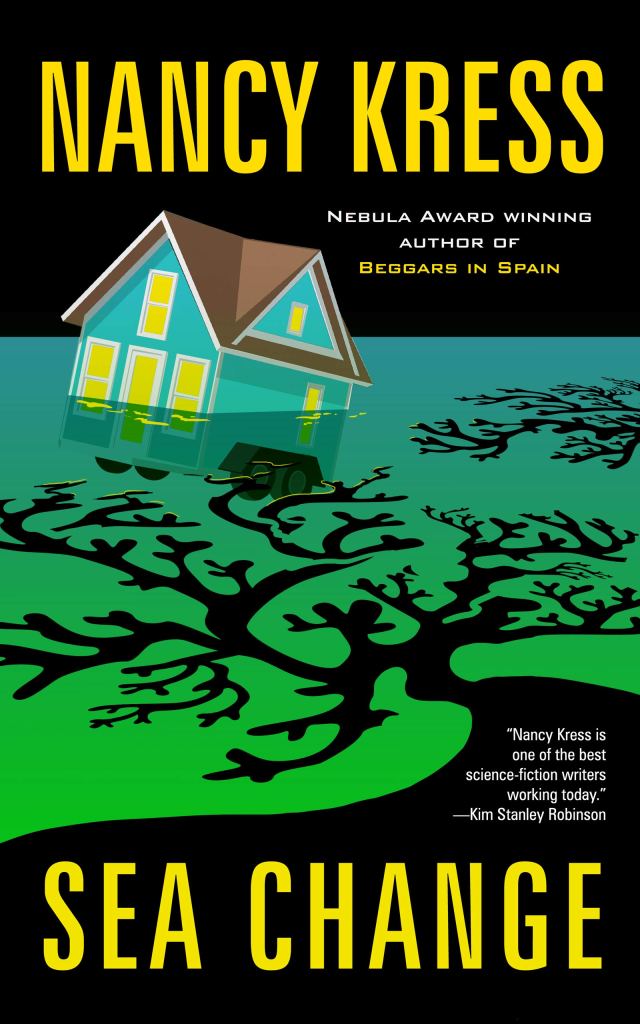⮌ SFRA Review, vol. 50, no. 2-3
Fiction Reviews
Review of Sea Change by Nancy Kress
Jeremy Brett
Nancy Kress. Sea Change. Tachyon, 2020. Paperback. 191 pp. $15.95. ISBN 9781616963316.

It’s a singular book that begins with a runaway self-driving house, and Nancy Kress has mastered the art of the opening line. Sea Change begins with the words “The house was clearly lost.” It’s a funny, yet at the same time jarring, line that instantly tells the reader that something has clearly shifted in the world. And so it has. Kress gives us a United States where normal life is increasingly rare as the effects of climate change and man-made environmental collapse encroach more and more on society. Of course, in our age of climate change this is not groundbreaking in itself, but Kress puts a unique spin on it by avoiding a simple “Us (environmentalists) vs. Them (the government, or Big Business, or terrorists)”. Instead, in Sea Change Kress presents a bio-thriller with a multifaceted setting in which environmental groups battle the government but also compete amongst themselves with different agendas and tactics. The tendency of humanity to fracture runs deep through Kress’s book; however, just as strong is humanity’s endurance in the face of catastrophe. As protagonist Renata notes:
Most of all, I felt fear. Not for myself but for the organization that always hovered between detection and ineptitude, the organization made of dedicated amateurs up against both law-enforcement professionals and a stupid public, the organization that I would protect with everything in the world until we’d succeeded in our quixotic attempt to save that—probably unworthy—world from itself, whether it wanted that or not.
Sometimes the world doesn’t know what’s best for it.
17
Climate change fiction faces unique challenges. It’s easy and even seductive to simply write an apocalyptic dystopia where we’re all going to die and where humans in the last days of civilization carve out meager or desperate existences by feeding on others. That kind of dark pessimism has run through science fiction since its beginnings, carrying into the Cold War with its numberless tales of nuclear holocaust through the environmental disasters chronicled by Brunner and Harrison, into today’s endless, increasingly tiresome zombie apocalypses. However, writers like Kress are also finding a space in their climate change fiction for hope. We need hope, if we are to survive the existential and psychological crisis that climate change represents. We need stories in which humanity actively works to slow or repair the damage it has caused. We need them so very desperately, and as readers we are fortunate enough to have a cadre of hopeful authors such as Kim Stanley Robinson, Kelly Robson, L.X. Beckett, Neil Stephenson, and others who chronicle our drive to be better, to do better, to fix what we have broken.
Sea Change is such a work, wrapped in the fabric of a well-paced biothriller. Kress chronicles a world suffering in the aftermath of “the Catastrophe”: a widespread drug is infected by a genetically modified bacterium that picks up a lethal gene; hundreds of children die as a result. In the aftermath, worldwide protests—many of them violent—against genetically modified organisms (GMOs) cause deaths, widespread economic collapse, and government overstrain and neglect. In Kress’s new world, GMOs are outlawed, their ban heavily enforced by the US government (through a powerful new Department of Agricultural Security), with the result that massive food shortages are endemic. And underground organizations fight back. Renata is a member of the Org, a resistance group working, as she says, “to restore genetic engineering to a country that had rejected it, and so feed the United States and the world as climate change, desertification, and rising seas changed the face of the globe” (71). One of the ways the Org fights back is through a covert, fragmented network of isolated farms that use engineered crops. It’s an unusual resistance strategy and one of the things that makes Kress’s book so unique.
Quiet, determined resistance is the hallmark of Sea Change (although the book certainly has its share of more dramatic actions, much of it hinted at or appearing ‘offscreen’, as it were). Renata moves forward in the face of unspeakable personal tragedy, including the death of a child, caused ultimately by effects of climate change. She and her compatriots operate an underground group, that seeks to change the world, not violently, but rather through the distribution of scientific achievement and accurate information. They operate with a hopeful belief that change is possible.
Near the end of the novel, following a massive pro-GMO information dump across cyberspace by different environmental groups, Renata notes that “seeds had been planted, and the harvest of changed perceptions might grow” (183). Here is Kress’s optimism, here is the hope that people can change their minds for the better, that they can overcome their fears and their distrust to make a potentially better future. This is not easy; Kress expertly and simply delineates what a society permeated by fear and suspicion looks like, and it is not an easy one to escape. But recall that the term ‘sea change’, taken from Shakespeare’s The Tempest, denotes a substantial change in one’s perceptions. If the change comes, as the Catastrophe did, it must be large-scale and it must produce a long-lasting alteration in people’s behavior. The future of the Earth demands it. Sea Change is a welcome addition to the growing subgenre of climate change fiction that bursts with hope. If nothing else, if we ignored Kress’s clever worldbuilding and her engaging characterizations, that belief in hope makes it worthy.

One thought on “Review of Nancy Kress’s Sea Change”